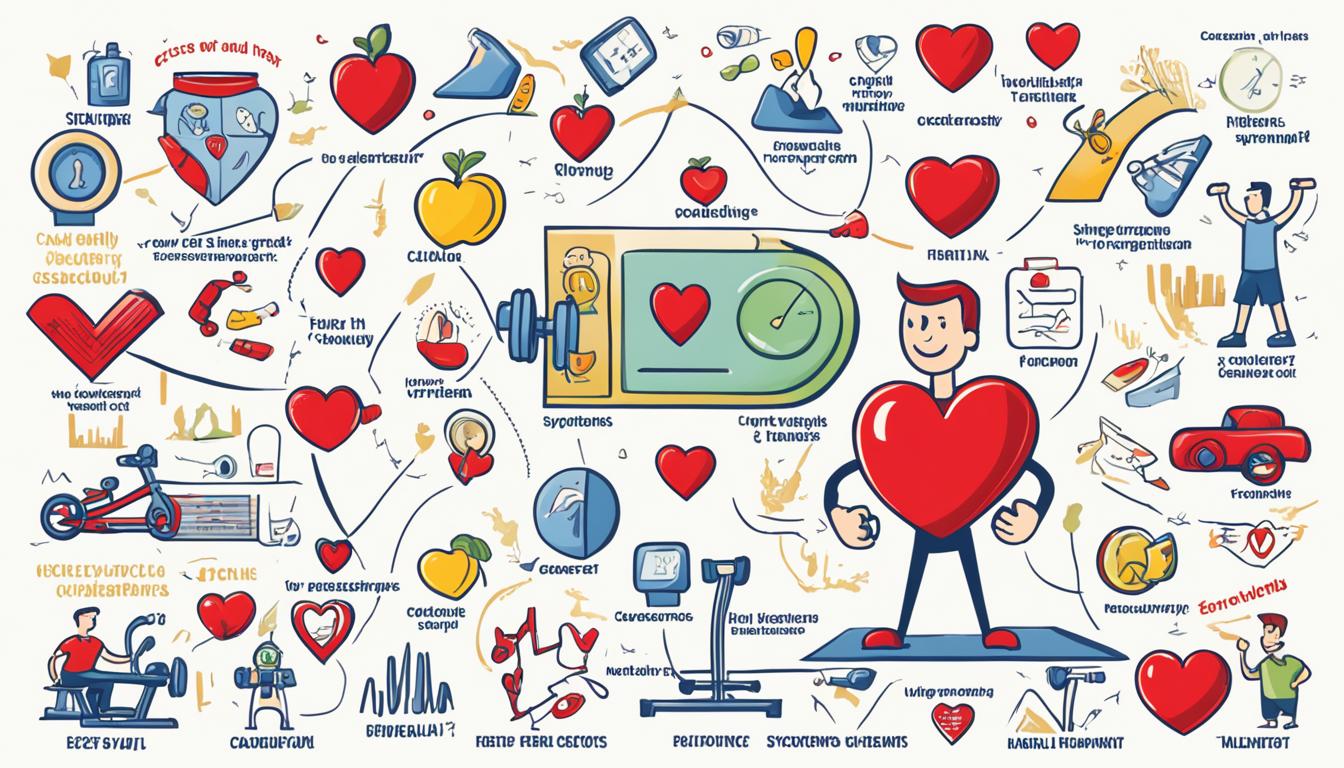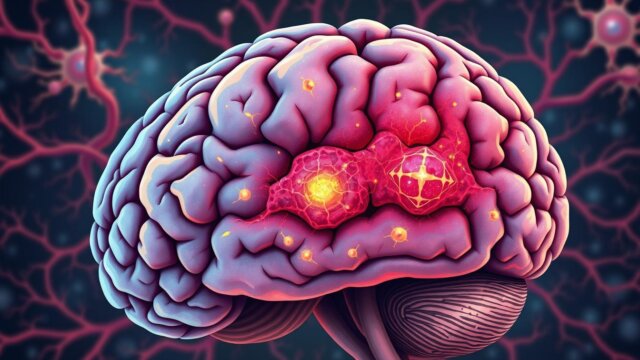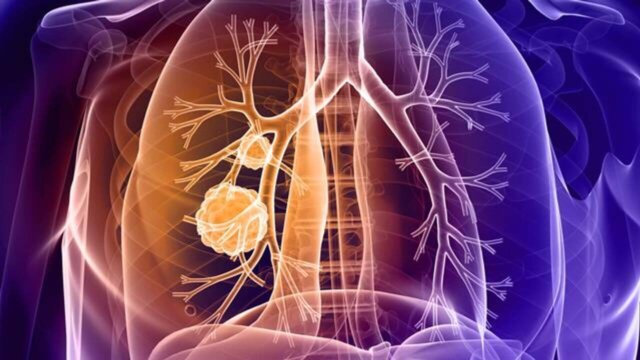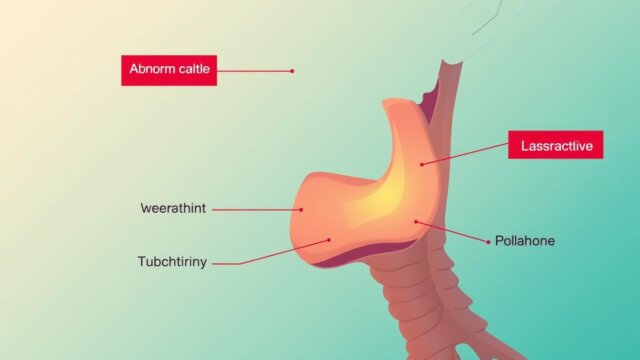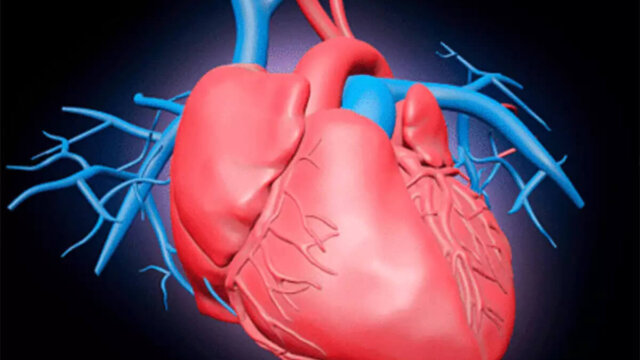FTC disclaimer: This post may contains affiliate links and we will be compensated if you click on a link and make a purchase.
Cardiovascular disease (CVD) is now the top cause of death worldwide. It took 17.9 million lives in 2016 and made up 31% of all early deaths. By 2030, it’s expected to cause 23.6 million deaths a year. This makes it more important than ever to know about cardiovascular health.
Coronary artery disease (CAD) is the most common heart disease in the U.S. It affects nearly half of all adults. This guide will cover the types, causes, symptoms, and treatments of cardiovascular diseases. It aims to help you take steps towards a healthier heart.
Key Takeaways
- Cardiovascular disease is the leading cause of death worldwide, responsible for over 17 million deaths annually.
- Coronary artery disease is the most prevalent type of heart disease in the U.S., affecting nearly half of all adults.
- Risk factors for cardiovascular disease include high blood pressure, high cholesterol, smoking, obesity, physical inactivity, and poor diet.
- Early detection and management of cardiovascular health conditions are crucial for effective treatment and prevention of complications.
- Lifestyle modifications, such as a healthy diet, regular exercise, and stress reduction, can significantly improve cardiovascular health.
Introduction to Cardiovascular Health
Cardiovascular health is key to feeling good and staying healthy. It’s about the heart and blood vessels working right. A healthy cardiovascular system makes sure oxygen-rich blood gets to all parts of the body. This helps organs and tissues work their best. Keeping your heart and blood vessels in good shape lowers the risk of heart problems and strokes.
The circulatory system, or cardiovascular system, carries blood, oxygen, and nutrients to every cell. When it works well, it keeps the body healthy and active. But if it gets damaged, it can lead to serious heart diseases like coronary artery disease and heart failure.
It’s important to know about cardiovascular diseases to keep your heart healthy and lower your risk. By taking care of your heart, you can prevent or manage these diseases. This makes life better overall.
“Cardiovascular diseases are the number one cause of death globally, with an estimated 17.7 million deaths in 2015.”
Knowing how important heart health is the first step to a better life. By learning about the heart and blood vessels, you can make smart choices and get the right medical care. Taking care of your heart is a big step towards a long and healthy life.
Types of Cardiovascular Diseases
Cardiovascular diseases cover many conditions that hit the heart and blood vessels. They include coronary artery disease, arrhythmia, and heart failure.
Coronary Artery Disease
Coronary artery disease (CAD) is the top heart disease. It happens when plaque builds up in the coronary arteries. This can cut down blood flow to the heart, causing chest pain, heart attacks, and more.
Arrhythmia
Arrhythmia means your heartbeat is not regular. It can be too fast, too slow, or all over the place. Atrial fibrillation is a type of arrhythmia that raises the risk of stroke and other heart issues.
Heart Failure
Heart failure happens when the heart can’t pump blood well. This is because the heart muscle gets weak or stiff. Symptoms include shortness of breath, feeling tired, and swelling in the legs or ankles.
Heart failure affects over 6.7 million people in the U.S. and is expected to rise to 8.5 million by 2030.
Type of Cardiovascular Disease | Description | Key Statistics |
|---|---|---|
Coronary Artery Disease (CAD) | Buildup of plaque in the coronary arteries, restricting blood flow to the heart. | – Cardiovascular disease is the leading cause of death in the U.S. – Strokes are the leading cause of disability and one of the top causes of death in the United States. |
Arrhythmia | Irregular heartbeat, such as atrial fibrillation or ventricular tachycardia. | – About 8 out of every 1,000 children are born with congenital heart disease. |
Heart Failure | Weakened or stiffened heart muscle that struggles to pump blood effectively. | – Affecting more than 6.7 million people, heart failure is a major health problem in the United States. – The number of people diagnosed with heart failure is projected to rise to 8.5 million Americans by 2030. |
Causes of Cardiovascular Diseases
Risk Factors for Coronary Artery Disease
Atherosclerosis is the main cause of many heart diseases. It happens when fatty deposits build up in the arteries. Many risk factors can make it more likely to get coronary artery disease, the most common heart disease.
Some risk factors can’t be changed, like age, gender, and family history. But, there are others you can change to lower your risk. These include high blood pressure, high cholesterol, diabetes, being overweight, not moving enough, and smoking.
What you do every day affects your heart health. The World Health Organization says up to 80% of heart attacks and strokes could be prevented. High blood pressure, high cholesterol, being overweight, and diabetes are big factors in heart disease deaths.
Being active, eating well, and managing stress are key to a healthy heart. The American Heart Association shares important facts and tips on heart health. This can help people understand their risks and make better choices for their hearts.
Knowing and dealing with risk factors for coronary artery disease helps people take charge of their heart health. This can greatly lower the chance of heart problems.
Symptoms of Cardiovascular Diseases
Cardiovascular diseases show many symptoms, some easy to spot, others not so much, especially early on. Common signs include chest pain or discomfort (angina), shortness of breath, feeling tired, irregular heartbeat, and pain in the arms, back, neck, jaw, or stomach.
Angina, a sign of coronary artery disease, feels like pressure or tightness in the chest. This feeling can spread to the shoulders, arms, neck, or jaw. Shortness of breath, or dyspnea, happens often, even when you’re not active. People with these diseases might feel very tired, even with easy tasks.
Irregular heartbeats, or arrhythmias, can signal a heart disease. They might feel like a flutter in the chest, a fast or slow heartbeat, or missing beats. Some might feel pain in other body parts like the arms, back, neck, jaw, or stomach, which could mean a heart issue.
Some people with heart disease don’t show symptoms early on. This shows why regular doctor visits and tests are key to catching problems early.
Knowing the signs of heart disease is key to getting help fast and starting the right treatment. By spotting these signs, people can look after their heart health and feel better overall.
Symptom | Description |
|---|---|
Chest Pain/Discomfort (Angina) | A feeling of pressure, tightness, or pain in the chest that may radiate to the shoulders, arms, neck, or jaw. |
Shortness of Breath (Dyspnea) | Difficulty breathing, particularly during physical activity or at rest. |
Fatigue | Extreme tiredness, especially during activities that were previously manageable. |
Irregular Heartbeat (Arrhythmia) | Fluttering sensation in the chest, rapid or slow heart rate, or skipped beats. |
Pain/Discomfort in Other Areas | Pain or discomfort in the arms, back, neck, jaw, or stomach. |
Spotting these signs of heart disease helps people get medical help fast and take care of their heart health.
Diagnosis of Cardiovascular Diseases
Diagnosing heart diseases needs a full check-up with many tests. Doctors use different methods to see how your heart is doing and find any problems. Some top tests for diagnosing heart disease, cardiac testing, and imaging procedures are:
Electrocardiogram (ECG)
An ECG checks your heart’s electrical activity. It spots weird heart rhythms, finds signs of a heart attack, or watches your heart health over time.
Echocardiogram
An echocardiogram uses sound waves to make heart images. Your doctor can see how your heart works, like its structure and valves.
Stress Test
A stress test watches how your heart works when you’re active. It spots blood flow problems to your heart muscle.
Cardiac Catheterization and Angiogram
Cardiac catheterization and angiogram put a thin tube with dye into your arteries. This lets doctors see blockages or narrow spots in your heart arteries.
Cardiac CT Scan
A cardiac CT scan makes detailed heart images. It helps find and check heart diseases, like coronary artery disease.
These tests, with a full medical history and physical check-up, help doctors make the right diagnosis. They can then plan the best care for your heart.
“Early detection and action are key to managing heart diseases. With the latest tests, doctors can spot problems and make good treatment plans for your heart health.”
Treatment of Cardiovascular Diseases
Treating heart disease often means making many changes. This includes changing your lifestyle, taking medicines, and having medical procedures. Eating healthy, exercising often, and stopping smoking can really help your heart. Medicines are also key for managing things like high blood pressure and heart failure.
Lifestyle Modifications
- Eat a diet full of fruits, veggies, whole grains, and lean meats.
- Try to move your body for 30 to 60 minutes every day.
- Stop smoking to lower your heart disease risk.
- Get 7 to 9 hours of sleep each night for your health.
Medications
Here are some medicines you might need:
- ACE inhibitors and ARBs for high blood pressure
- Statins to help lower your cholesterol
- Beta-blockers to keep your heart rate and blood pressure in check
- Diuretics to get rid of extra fluid and salt
- Anticoagulants to stop blood clots
Medical Procedures
For very serious heart issues, you might need surgery or other procedures:
- Angioplasty and stent placement to clear blocked arteries
- Coronary artery bypass surgery to improve blood flow
- Heart transplant for very bad heart damage or failure
Getting regular check-ups with your doctor is key to managing heart diseases. By making lifestyle changes, taking the right medicines, and getting the right procedures, you can help take care of your heart health.

Prevention of Cardiovascular Diseases
Living a healthy life is the best way to stop preventing heart disease. This means eating well, moving often, handling stress, and not smoking or drinking too much. Keeping an eye on things like high blood pressure, high cholesterol, and diabetes can also lower your risk of cardiovascular disease prevention.
- Quit smoking: Smoking lowers oxygen in the blood, making blood pressure and heart rate go up. Stopping smoking can cut your heart disease risk in just a day. After a year without smoking, your risk is half that of a smoker.
- Exercise regularly: Moving for 150 minutes a week can help lower your heart disease risk.
- Maintain a healthy weight: Being overweight or obese is linked to high cholesterol, high blood pressure, and heart disease risk. A waist size over 40 inches for men and 35 inches for women also raises heart disease risk.
- Get enough sleep: Most adults need seven hours of sleep each night to avoid obesity, high blood pressure, heart attack, diabetes, and depression.
- Manage stress: Stress can lead to high blood pressure and increase your risk of heart disease.
Checking your blood pressure, cholesterol, and diabetes regularly is key to cardiovascular disease prevention. Some infections, like gum disease, can also raise your risk of heart and blood vessel diseases.
Screening Recommendation | Age Range |
|---|---|
Blood pressure screening | Start in childhood, then annually starting at age 40 |
Cholesterol screening | Start between ages 9-11, repeat every five years, more frequent as age increases |
Type 2 diabetes screening | Start at age 45, or earlier if risk factors present |
By choosing a healthy lifestyle and watching your risk factors, you can greatly lower your chance of getting cardiovascular disease prevention.
“Tobacco use raises the risk for chronic illness; all tobacco products increase this risk. After quitting, the body starts to heal from tobacco’s damage.”
Eating well, staying active, and managing stress are also important for preventing heart disease.
Cardiovascular Health and Risk Factors
Keeping your heart healthy is key because heart disease is the top cause of death in the U.S. Knowing what can increase your risk is the first step to staying healthy.
Important risk factors include your age, gender, family history, and some health conditions. Half of Americans have a risk factor like high blood pressure, high cholesterol, or smoking. People with diabetes are more likely to die from heart disease, showing why managing diabetes is crucial.
Some risks, like your age and family history, can’t be changed. But, many others, like high blood pressure and smoking, you can change. Making lifestyle changes and getting medical help can lower these risks.
Modifiable Risk Factors | Non-Modifiable Risk Factors |
|---|---|
High blood pressure | Age |
High cholesterol | Gender |
Diabetes | Family history |
Obesity | Race and ethnicity |
Lack of physical activity | |
Smoking | |
Unhealthy diet | |
Excessive alcohol consumption | |
Stress |
Knowing and tackling these risks helps you keep your heart healthy and lowers your chance of heart disease. Regular health checks, changing your lifestyle, and managing health conditions are key to staying healthy.
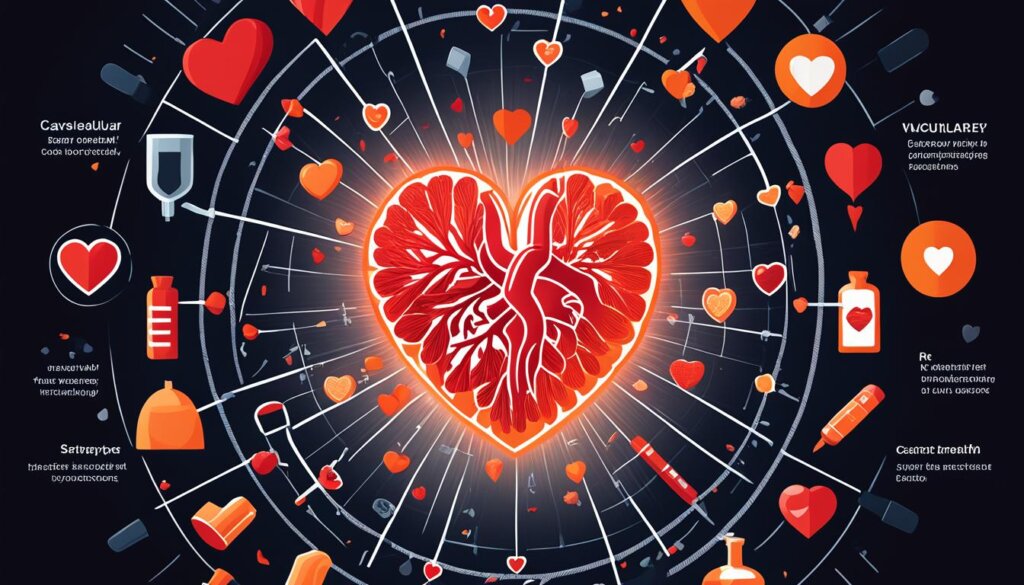
“Heart disease is the number one killer for both men and women, and the risk increases with age.”
Healthy Diet for Cardiovascular Wellness
Eating right is key to a healthy heart and cutting down heart disease risk. Focus on whole, nutrient-rich foods. Avoid foods high in bad fats, salt, and sugar.
Here are tips for a heart-healthy diet:
- Avoid foods with lots of saturated fats, like fatty meats and high-fat dairy.
- Choose foods with less sodium, look for “low sodium” or “no salt added”.
- Eat a mix of veggies, fruits, beans, and whole grains for fiber.
- Go for low-fat dairy like milk, yogurt, cheese, and soy drinks.
- Choose whole grains over refined ones, like whole-wheat bread and brown rice.
- Add lean proteins like seafood, poultry, beans, and tofu to your meals.
- Use healthy fats from seafood, nuts, avocados, and oils instead of bad fats.
- Use vegetable oils and pick low-fat mayonnaise over full-fat ones.
Follow these tips and make heart-healthy choices to boost your heart health and lower disease risk.
“A healthy diet is a powerful tool in the fight against heart disease. By making smart food choices, you can improve your heart health and reduce your risk of cardiovascular complications.”
A balanced diet can help control high blood pressure and high cholesterol. This supports your heart health.
Nutrient | Recommendation | Reason |
|---|---|---|
Saturated Fat | Less than 6% of total daily calories | To lower blood cholesterol levels |
Sodium | No more than 2,300 mg per day, ideally 1,500 mg | To reduce the risk of high blood pressure |
Found in fish like salmon, mackerel, and herring | To lower blood triglyceride levels | |
Whole Grains | Brown rice, barley, quinoa | To promote heart health |
Exercise for Cardiovascular Fitness
Keeping your heart healthy is key to feeling good. Regular physical activity is a big part of that. Experts say you should do at least 150 minutes of moderate-intensity aerobic exercise or 75 minutes of vigorous-intensity aerobic exercise each week. This helps your heart work better, lowers blood pressure, and cuts down the risk of cardiovascular diseases.
It’s also good to add resistance training to your workout plan. Doing strength exercises two days a week is best for your heart. Mixing aerobic and strength training can boost your HDL (good) cholesterol and lower LDL (bad) cholesterol.
Even though flexibility workouts like stretching don’t directly help your heart, they’re still important for your muscles.
A recent study found that you should exercise at least four to five days a week for heart health. You should do moderate-intensity workouts for two or three days a week, and longer, high-intensity ones for at least an hour a week. High-intensity training, like the 4×4 HIIT routine, is good once a week, and you can do it again if you like. Strength training should happen one or two days a week.
This study, with people aged 53 on average, showed that this exercise plan can undo the harm of a sedentary life. It can make your heart more flexible and youthful, even in your 50s.

By mixing up your physical activity with aerobic, resistance, and flexibility exercises, you can really boost your cardiovascular fitness and heart health.
Stress Reduction Techniques
Chronic stress can lead to heart disease. It can cause burnout, depression, and anxiety. These issues can make your heart work harder and increase blood pressure.
Practices like meditation and yoga can help. Listening to calm music also helps. Getting enough sleep is key for managing stress.
Exercise can ease stress and improve mood. Being close to friends and family is important too. Doing fun activities and staying positive can also help.
Stress can cause muscle pain and headaches. It can also lead to high blood pressure. But, good stress can make you feel better and more connected.
Using stress reduction techniques can help keep your heart healthy. Find what works for you and stick with it for a better life.
Smoking Cessation Programs
Quitting smoking is a big step for better heart health. Smoking is a major risk for heart problems like coronary artery disease and heart failure. Joining a smoking cessation program can help you quit and lower heart risks.
Smoking is a big health issue worldwide, with 1.1 billion smokers globally. Even though smoking rates are dropping, the heart risks are still huge. In the U.S., smoking causes about half a million deaths and costs over $600 billion a year.
Quitting smoking brings big heart health benefits right away. Within 1-2 years, your risk of heart disease drops a lot, and it gets closer to never-smokers’ risk. Quitting also lowers the risks of other heart problems like Aneurysm and Atrial fibrillation.
Resources like nicotine therapy, counseling, and support groups help you quit and stay smoke-free. Start taking care of your heart by looking into these programs in your area or through your doctor.
“Smoking cessation reduces the risk of all-cause mortality, death due to cardiac causes and sudden death, as well as new and recurrent cardiac events.”

Your heart health is crucial. Quitting smoking and using available resources can greatly improve your heart health and lower heart risks. Start your journey to a healthier, smoke-free life today.
Cholesterol Management
Keeping your cholesterol levels healthy is key for your heart. High levels of “bad” cholesterol can cause plaque to build up in your arteries. This increases your risk of heart disease. By controlling cholesterol, you can protect your heart.
Your total cholesterol should be around 150 mg/dL. LDL, or “bad” cholesterol, should be about 100 mg/dL. HDL, or “good” cholesterol, should be at least 40 mg/dL for men and 50 mg/dL for women. Eating too much saturated and trans fats and not moving enough can raise your cholesterol. This increases your risk of heart problems like chest pain, heart attacks, and stroke.
To manage your cholesterol, try changing your diet, exercising more, and taking cholesterol medicine if needed. The 2018 guidelines say statins are key for those at risk of heart disease. Doctors and patients should work together on this. For very high-risk people, other medicines might be suggested.
Changing your lifestyle can help too. Eat foods low in bad fats, move more, and stop smoking. Losing 5% to 10% of your weight can also help.
Being active in managing your cholesterol is a big step towards heart health. Work with your doctor to make a plan that fits you.
Blood Pressure Control
Keeping a healthy blood pressure is key to stopping cardiovascular disease. High blood pressure, or hypertension, hits nearly half of U.S. adults (47%). Sadly, 74% of those affected don’t have their blood pressure under. High blood pressure can cause serious issues like heart attacks, strokes, heart failure, and kidney disease.
To manage blood pressure well, we need a full plan. Eating right, staying active, and handling stress can really help. Some groups, like non-Hispanic Black people, and those with less money or no insurance, often struggle with high blood pressure.
Many times, medicine is needed to manage hypertension. But only 40% of people with high blood pressure take the right mix of medicines. Using standardized hypertension protocols and self-measured blood pressure monitoring can make a big difference. This leads to better blood pressure control and fairer care.
Factors Influencing Blood Pressure Control | Impact |
|---|---|
Healthy Diet | Reduces blood pressure by 5.5/8.3 mm Hg |
Regular Exercise | Helps keep blood pressure healthy |
Stress Management | Lowers blood pressure by easing stress |
Medication Adherence | Only 33% of patients stick to their blood pressure meds |
Socioeconomic Status | Those with less money are less likely to control their blood pressure |
By tackling these issues and using proven methods, people can better manage their blood pressure. This lowers the risk of cardiovascular disease. Keeping blood pressure in check is key for good heart health and avoiding problems.
Conclusion
Keeping your heart healthy is key to feeling good overall. By learning about heart diseases, their causes, and risk factors, you can protect your heart. This helps lower the risk of serious heart problems.
Regular health checks and catching problems early are important. A healthy lifestyle helps too. Eating right, exercising, and managing stress can prevent heart disease.
Heart disease is a big issue worldwide, especially in poorer countries. But, we can fight this with smart, evidence-based actions. By focusing on heart health, we can make a better future for everyone.
FAQ
What are the most common types of cardiovascular diseases?
Coronary Artery Disease (CAD), Arrhythmia, and Heart Failure are the top types of cardiovascular diseases.
What are the primary causes of cardiovascular diseases?
Atherosclerosis, the buildup of plaque in arteries, is the main cause. Risk factors include age, gender, family history, and more.
What are the common symptoms of cardiovascular diseases?
Symptoms include chest pain, shortness of breath, and fatigue. Some may have no symptoms early on.
What are the diagnostic tests used to detect and evaluate cardiovascular diseases?
Tests like the ECG, Echocardiogram, and Stress Test are used. Cardiac Catheterization and Angiogram, and Cardiac CT Scan are also used.
What are the main treatments for cardiovascular diseases?
Treatments include lifestyle changes and medications. Procedures like angioplasty and stent placement help improve blood flow.
How can I prevent cardiovascular diseases?
A healthy lifestyle is key. Eat well, exercise, manage stress, and don’t smoke. Keep an eye on risk factors like blood pressure and cholesterol.
What are the key risk factors for cardiovascular diseases?
Risk factors include age, gender, and family history. Lifestyle choices like diet and exercise can help control these risks.
How can a healthy diet help promote cardiovascular health?
Eating fruits, veggies, whole grains, and lean proteins helps. Avoid too much fat and sugar. A balanced diet can lower heart disease risk.
How does regular physical activity benefit cardiovascular health?
Exercise keeps the heart healthy. Aim for 150 minutes of moderate exercise a week to lower heart disease risk.
How can stress management techniques improve cardiovascular health?
Stress can harm the heart. Techniques like meditation and yoga can lower blood pressure and improve heart health.
How does quitting smoking benefit cardiovascular health?
Smoking harms the heart. Quitting can reduce heart risks. Use support programs and therapy to help.
Why is maintaining healthy cholesterol levels important for cardiovascular health?
Healthy cholesterol levels are key. High LDL cholesterol can cause heart disease. A healthy diet and exercise can help manage cholesterol.
How does managing high blood pressure benefit cardiovascular health?
High blood pressure is a big risk. Managing it with diet, exercise, and medication can lower heart disease risk.
